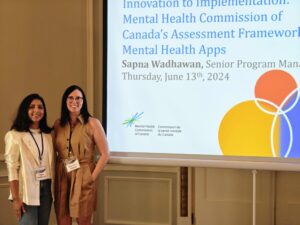Tech Support

Subscribe to Catalyst
Subscribe to get our magazine delivered right to your inbox
Related Articles
Related Articles
It is midnight where you are, and you need immediate mental health support – but there are no services open. You find an app that offers culturally adapted peer-supported services from those trained in mental health – and you access the support you need.
You are a parent of a young child with little time and would like to access mental health support and counselling. You are able to log in online to an e-mental health session once you have put your child to bed and can get the support you need.
You have newly arrived in Canada from a country that views mental health support negatively and the stigma you feel is preventing you from accessing in-person care. You see that there is an online e-mental health service available where you can maintain your anonymity and you are able to access the mental health support that you need.
Mind the gap
These are just a few of the stories I hear as the manager of e-mental health at the Mental Health Commission of Canada. I lead a team that works closely with experts in Canada and around the world, including those with lived and living experience. Together, we collaborate to develop resources, frameworks, and supports around best-practices for those implementing e-mental health solutions in Canada. We work to demystify technology and focus on how quality e-mental health services have the potential to increase access to mental health services for those living in Canada. Increasing the quality of e-mental health support can also increase trust in these services. This means that people living in Canada have the flexibility to choose safe and effective care, when, where, and how they want.
We have witnessed many stories where gaps to accessing health care were bridged by technology.
Consider someone seeking support for an eating disorder, who doesn’t know where to go for help, or may not have services in their area. A service such as Body Peace Canada – a free, online source for those seeking support with eating disorders – provides access to resources and support.
The robots are coming

Maureen Abbott, right, with colleague Sapna Wadhawan, program manager at the MHCC, at a recent presentation of the MHCC Mental Health App Assessment Framework.
The term artificial intelligence (AI) may make some people uncomfortable or bring to mind visions of dubious robots. Hesitation and healthy skepticism are valid stances. With fast-moving technology comes big questions, along with big shifts that can improve access to quality care.
AI is being used in many ways to improve mental health care, from improving user experience navigating online systems, to saving time for practitioners by helping them to develop themes from their notes and connecting them to electronic health records.
The Mental Health Commission of Canada collaborated with CADTH – the Canadian Agency For Drugs And Technologies In Health – to develop reports on the uses and trends of AI in mental health. With the pending Bill C-27, aimed at enhancing consumer privacy, regulating AI, and updating data protection laws, those looking at safety with AI and mental health should be considering potential bias in the programming: think over- or underdiagnosing certain populations based on race or gender and how a reliance on existing data can replicate those harms. Or missing the mark by developing culturally insensitive material because it was not developed in consultation with the end users.
It is essential to involve clinicians and people with lived and living experience in the development and testing along with taking a human-centered approach to user design and testing. This means assuring that the privacy statement is clear, letting the end user know when they are interacting with a bot rather than a real person, indicate how their personal information is being used, and if it will be stored and shared – and if so, the details around that data use. Implementing best practices around data and privacy and promoting this to the general public will help to ensure trust among users and a broader uptake.
This focus on safety and best practices for AI use in mental health care is one of the recommendations being brought forward in the E-Mental Health Strategy for Canada, which will be released at the E-Mental Health International Collaborative (eMHIC) Digital Health International Congress September 19-20, 2024 in Ottawa. Developed with those with lived experience, policy makers, practitioners, and health leaders, the strategy will highlight six key priorities and 12 recommendations for e-mental health in Canada.
It’s important to have standards
When integrated properly and into mental health care delivery, e-mental health is just as effective as face-to-face services, and the technology is improving every day. Not only will this result in more people getting help faster, but it can also reduce the personal costs of accessing services and the costs of organizations accrue in implementing mental health services.
Some people may feel most comfortable accessing mental health services in an in-person environment, while others may choose an app or another e-mental health solution (such as online therapy) to access mental health services. The important part is for those living in Canada to have the opportunity to choose the types of services that work for them and that those mental health services are of a high-quality: safe, accessible, effective, and culturally adapted.
The e-mental Health team at the Mental Health Commission of Canada has been working to ensure the best practices are in place when implementing e-mental health services.
How? One example is the MHCC Mental Health App Assessment Framework. These national standards are meant to improve the quality of apps for people living in Canada. Before its publication, access to safe, secure, and effective mental health apps was largely undefined in Canada. The framework was developed with 200 collaborators in Canada and internationally, including those with lived and living experience, policy makers, government officials, app developers and designers, academic researchers, and mental health service providers to develop the framework.
The Cultural Safety, Social Responsibility and Equity standard within the framework includes content on Indigenous data security and privacy, gender equity, and representation from racialized communities. This framework is currently being used to assess a range of mental health apps in different provinces in Canada that are new or already widely adopted.
Al Raimundo was on the core development team for the framework and is a person with lived experience and an app developer. Raimundo says, the framework provides guidance for a range of products, even those that may not be immediately appealing to clinicians.
“Even if there’s something the professionals don’t love about an app, if people love them, then we should understand why. If a bunch of people are using it, something’s drawing them,” Raimundo says.
To help expand and better understand e-mental health services, the Mental Health Commission of Canada developed the E-Mental Health Implementation Learning Modules in collaboration with the Centre for Addiction and Mental Health (CAMH). The online learning modules are free, self-directed, and designed to give mental health providers, managers, leaders, and students the knowledge and skills they need to integrate e-mental health into their daily practice, and support effective, person-centered e-mental health service delivery.
Electronic mental health options are coming online quickly, and helpful standards and frameworks are being developed in tandem to bridge gaps between quality, demand and access.
The rapid advancement of e-mental health technologies offers immense potential to improve access to care. By prioritizing safety, quality, and cultural sensitivity, we can create a robust and reliable mental health support system that meets the needs of people in Canada.
Resources: Find a number of resources on the MHCC E-Mental Health page.
Guide: Where to Get Care – A Guide to Navigating Public and Private Mental Health Services in Canada
Maureen Abbott
A Masters-educated Manager and Certified Health Executive (Canadian College of Health Leaders) on the Innovation team at the Mental Health Commission of Canada (MHCC). Her work focusses on e-mental health, including the standardization of e-mental health apps in Canada, e-mental health implementation, artificial intelligence and mental health, an e-mental health strategy for Canada, strategic partnerships and stakeholder engagement, and knowledge exchange. Maureen is the Chair of the MHCC’s E-Mental Health Collaborative and a CHIEF Executive member with Digital Health Canada.